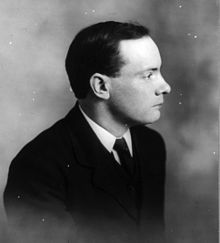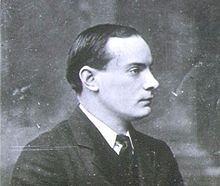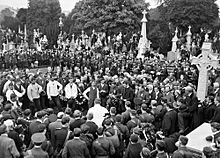Patrick Pearse
Irish revolutionary, shot by the British Army in 1916
Patrick Henry Pearse (10 November, 1879 – 3 May, 1916), known in Irish as Pádraic, Pádraig or Pádraig Anraí Mac Piarais, was a teacher, barrister, poet, writer, nationalist and political activist who was one of the leaders of the Easter Rising in 1916. He was declared "President of the Provisional Government" of the Irish Republic in one of the bulletins issued by the Rising's leaders, a status that was however disputed by others associated with the rebellion both then and subsequently.

Beware of the thing that is coming, beware of the risen people,
who shall take what ye would not give. Did ye think to conquer the people,
Or that Law is stronger than life and than men's desire to be free?


Quotes
edit- The lawyers have sat in council, the men with the keen long faces,
said, "This man is a fool," and others have said, "He blasphemeth;"
And the wise have pitied the fool that hath striven to give a life
In the world of time and space amongst the bulks of actual things,
To a dream that was dreamed in the heart, and that only the heart could hold.
Oh, wise men, riddle me this: What if the dream come true?- "The Fool"
- And I say to my people's masters: Beware,
Beware of the thing that is coming, beware of the risen people,
who shall take what ye would not give. Did ye think to conquer the people,
Or that Law is stronger than life and than men's desire to be free?
We will try it out with you, ye that have harried and held,
Ye that have bullied and bribed, tyrants, hypocrites, liars!
- Believe that we too love freedom and desire it. To us it is more desirable than anything in the world. If you strike us down now, we shall rise again and renew the fight. You cannot conquer Ireland you cannot extinguish the Irish passion for freedom: if our deed has not been sufficient to win freedom then our children will win it with a better deed.
- Notes for Revolutionaries Vol 2, Foilseacháin an Ghlór Gafa, Nova Print, Belfast, 2006, pg 65
- Our foes are strong and wise and wary; but, strong and wise and wary as they are, they cannot undo the miracles of God Who ripens in the hearts of young men the seeds sown by the young men of a former generation. And the seeds sown by the young men of '65 and '67 are coming to their miraculous ripening today. Rulers and Defenders of the Realm had need to be wary if they would guard against such processes. Life springs from death; and from the graves of patriot men and women spring living nations. The Defenders of this Realm have worked well in secret and in the open. They think that they have pacified Ireland. They think that they have purchased half of us and intimidated the other half. They think that they have foreseen everything, think that they have provided against everything; but, the fools, the fools, the fools! — They have left us our Fenian dead, and while Ireland holds these graves, Ireland unfree shall never be at peace.
- Closing words of graveside oration at the funeral of Jeremiah O'Donovan Rossa, 1 August 1915. The Cause Of Ireland, Liz Curtis, Beyond the Pale Publications, Belfast 1994, pg 266
- One of the most terrible things about the English education System in Ireland is its ruthlessness…it is cold and mechanical, like the ruthlessness of an immensely powerful engine. A machine vast, complicated… It grinds night and day; it obeys immutable and predetermined laws; it is as devoid of understanding, of sympathy, of imagination, as is any other piece of machinery that performs an appointed task. Into it is fed all raw human material in Ireland; it seizes upon it inexorably and rends and compresses and remoulds...
- The Cause Of Ireland, Liz Curtis, Beyond the Pale Publications, Belfast 1994, pg 190.This quote was taken from the original, in Padraig Pearse’s book The Murder Machine.
- O faithful!
Moulded in one womb,
We have stood together all the years,
All the glad years and all the sorrowful years,
Own brothers: through good repute and ill,
In direst peril true to me,
Leaving all things for me, spending yourself
In the hard service that I taught to you,
Of all the men that I have known on earth,
You only have been my familiar friend,
Nor needed I another.- "To My Brother", poem by P. H. Pearse, written in Arbour Hill Detention Barracks, 1st May, 1916. Published by The Office of Public Works, Dublin.
- Pearse did not know that his brother William, was also to be executed.
- When I was a child of ten, I went on my bare knees by my bedside one night and promised God that I should devote my Life to an effort to free my country. I have kept the promise. I have helped to organise, to train, and to discipline my fellow-countrymen to the sole end that, when the time came, they might fight for Irish freedom. The time, as it seemed to me, did come, and we went into the fight. I am glad that we did. We seem to have lost; but we have not lost. To refuse to fight would have been to lose; to fight is to win. We have kept faith with the past, and handed on its tradition to the future. I repudiate the assertion of the Prosecutor that I sought to aid and abet England’s enemy. Germany is no more to me than England is. I asked and accepted German aid in the shape of arms and an expeditionary force; we neither asked for nor accepted German gold, nor had any traffic with Germany but what I state. My object was to win Irish freedom. We struck the first blow ourselves, but I should have been glad of an ally’s aid. I assume that I am speaking to Englishmen who value their freedom, and who profess to be fighting for the freedom of Belgium and Serbia. Believe that we too love freedom and desire it. To us it is more than anything else in the world. If you strike us down now, we shall rise again, and renew the fight. You cannot conquer Ireland; you cannot extinguish the Irish passion for freedom. If our deed has not been sufficient to win freedom, then our children will win it by a better deed.”
- Patrick Pearse at his court-martial.Publish by the 75th Anniversary Committee, Dublin, 1991.
The Murder Machine
edit- A French writer has paid the English a very well deserved compliment. He says that they never commit a useless crime. When they hire a man to assassinate an Irish patriot, when they blow a Sepoy from the mouth of a cannon, when they produce a famine in one of their dependencies, they have always an ulterior motive.
- I have spent the greater part of my life in immediate contemplation of the most grotesque and horrible of the English innovations for the debasement of Ireland. I mean their education system. The English once proposed in their Dublin Parliament a measure for the castration of all Irish priests who refused to quit Ireland. The proposal was so filthy than although it duly passed the House and was transmitted to England with the warm recommendation at the Viceroy. it was not eventually adopted. But the English have actually carried out an even filthier thing. They have planned and established an education system which more wickedly does violence to the elemental human rights of Irish children than would an edict for the general castration of Irish males. The system has aimed at the substitution for men and women of mere Things. It has not been an entire success. There are still a great many thousand men and women in Ireland. But a great many thousand of what, by way of courtesy, we call men and women, are simply Things. Men and women. however depraved, have kindly human allegiances. But these Things have no allegiance. Like other Things. they are For sale. When one uses the term education system as the name of the system of schools. colleges, universities, and whatnot which the English have established in Ireland, one uses it as a convenient label, just as one uses the term government as a convenient label for the system of administration by police which obtains in Ireland instead of a government. There is no education system in Ireland. The English have established the simulacrum of an education system, but its object is the precise contrary of the object of an education system. Education should foster; this education is meant to repress. Education should inspire; this education is meant to tame. Education should harden; this education is meant to enervate. The English are too wise a people to attempt to educate the Irish in any worthy sense. As well expect them to arm us. Professor Eoin MacNeill has compared the English education system in Ireland to the systems of slave education which existed in the ancient pagan republics side by side with the systems intended for the education of freemen. To the children of the free were taught all noble and goodly things which would tend to make them strong and proud and valiant; from the children of the slaves all such dangerous knowledge was hidden.
- It is because the English education system in Ireland had deliberately eliminated the national factor that it has so terrifically succeeded. For it has succeeded - succeeded in making slaves of us. And it has succeeded so well that we no longer realise that we are slaves. Some of us even think our chains ornamental, and are a little doubtful as to whether we shall be quite as comfortable and quite as respectable when they are hacked off.
Address delivered at the Grave of Wolfe Tone in Bodenstown Churchyard, Co. Kildare, 22 June 1913
edit- We have come to the holiest place in Ireland; holier to us even than the place where Patrick sleeps in Down. Patrick brought us life, but this man died for us. And though many before him and some since have died in testimony of the truth of Ireland’s claim to nationhood, Wolfe Tone was the greatest of all that have made that testimony, the greatest of all that have died for Ireland whether in old times or in new. He was the greatest of Irish Nationalists; I believe he was the greatest of Irish men. And if I am right in this I am right in saying that we stand in the holiest place in Ireland, for it must be that the holiest sod of a nation’s soil is the sod where the greatest of her dead lies buried.
- To his teaching we owe it there is such a thing as Irish Nationalism and to the memory of the deed he nerved his generation to do, to the memory of ‘98, we owe it that there is any manhood left in Ireland.
- Think of Tone. . . Think of how he put virility into the Catholic movement, how this heretic toiled to make free men of Catholic helot, how as he worked among them he grew to know and love the real, the historic Irish people, and the great, clear, sane conception came to him that in Ireland there must be not two nations or three nations but one nation, that Protestant and Dissenter must be brought into amity with Catholic and that Catholic, Protestant and Dissenter must unite to achieve freedom for all.
- And let us make no mistake as to what Tone sought to do, what it remains to us to do. We need to restate our programme: Tone has stated it for us:
"To break the connection with England, the never-failing source of all our political evils, and to assert the independence of my country—these were my objects. To unite the whole people of Ireland, to abolish the memory of all past dissentions, and to substitute the common name of Irishmen in place of the denominations of Protestant, Catholic and Dissenter—these were my means."
I find here implicit all the philosophy of Irish nationalism, all the teaching of the Gaelic League and the later prophets. Ireland one and Ireland free—is not this the definition of Ireland a Nation? To that definition and to that programme we declare our adhesion anew; pledging ourselves as Tone pledged himself—and in this sacred place, by this graveside, let us not pledge ourselves unless we mean to keep our pledge—we pledge ourselves to follow in the steps of Tone, never to rest either by day or night until his work be accomplished, deeming it the proudest of all privileges to fight for freedom, to fight not in despondency but in great joy hoping for the victory in our day, but fighting on whether victory seem near or far, never lowering our ideal, never bartering one jot or tittle of our birthright, holding faith to the memory and the inspiration of Tone, and accounting ourselves base as long as we endure the evil thing against which he testified with his blood.
Quotes about Pearse
edit- I have just done one of the hardest tasks I have ever had to do. I have had to condemn to death one of the finest characters I have ever come across. There must be something very wrong in the state of things that makes a man like that a rebel. I don't wonder that his pupils adored him.
- Charles Blackader, the British officer who chaired Pearse's court-martial, as cited in Frank M. Flanagan, "Patrick H. Pearse," Minerva, volume 1 (1997)
External links
edit- The Murder Machine - Pearse's groundbreaking article on Montessori education
- 1916 Walking Tour piece on Pearse